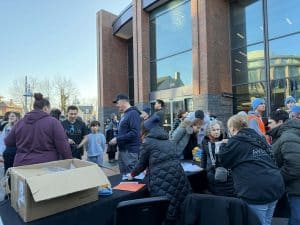December ushered in a cold snap all across Pennsylvania. The frosty temperatures prompted the opening of the Central Bucks Code Blue Shelter – administered by the Coalition to Shelter & Support the Homeless (CSSH) – a last-ditch effort on the part of concerned Bucks County residents to keep their unhoused neighbors from freezing to death.
Using space borrowed from faith communities throughout the county, CSSH operates an emergency drop-in shelter four months each year – beginning with Warminster’s Neshaminy Warwick Presbyterian Church in December. Three additional churches donate the space as the cold months wear on, and CSSH’s volunteer staff provides the personnel to make the shelter operational. A minimum of 14 volunteers is required to open the shelter on any given night.
Shelter openings are triggered by temperature. When the perceived temperature drops to 28 degrees Fahrenheit or lower, CSSH administration pulls from their pool of trained volunteers – every volunteer, from van drivers to overnight monitors, must undergo training.
Perceived temps calibrate the impact of wind, rain and other factors that contribute to bone chillingly harsh conditions for people living on the street.
At the urging of the Bucks County Opportunity Council, CSSH Board President Terry Lang and her colleagues agreed to set a “warmer” temperature trigger for the shelter, this cold weather season. Up two degrees from last year – from 26 to 28 degrees – Lang and her entirely unpaid staff agreed to open every Wednesday night, regardless of temperature, as well.
“Our goal is to provide 15 to 20 more nights of shelter this year than last,” Lang explained. “We’re piloting a program that allows for people to come into the shelter on a set day each week, so the area agencies can reach these high barrier people.”
Once the shelter guests arrive and get settled – some come by foot, some arrive in the cars they sleep in on warmer nights, and some catch the van provided by CSSH, which makes two stops in Doylestown and one in Warminster. Lang says, in addition to providing shelter, connecting the guests to more permanent support is the mission of CSSH. “That’s what we do, we build a bridge.”
Every federally authorized 501 c3 nonprofit agency must keep public records. The budget for each agency earning more than $50,000 annually is accessible via the internet. CSSH’s entire annual budget is under $150,000. In 2023, their expenses totaled $114,388. To put this in perspective, the median 2022 household income in Bucks County was $107,826. For less than $7,000 more than one family’s income – or what an ordinary Bucks County family has to survive on for a year and 22 days – CSSH provides the county’s most vulnerable individuals with more than 1,000 bed nights – protecting that median family’s poorest neighbors.
If the budget included donated time and space, it might be in the millions. Clearly, no dollar amount is attached to the facilities made available by the four congregations. And no one accounts for the hundreds of thousands of dollars in accumulated wage-value donated by 14 in-person staff people every single night of operation.
And this year, according to Ruth Boone, treasurer and long-time overnight volunteer, December came in like a lion. CSSH opened the 1st of the month and stayed open for the entire week because of the biting cold.
READ: New Documentary ‘Beyond the Bridge’ Takes Viewers on a Search for a Humane Solution to Homelessness
While it’s warmed up the past few nights, Boone promises the shelter will open regardless of temperature this Wednesday – in accordance with the new pilot program – as long as they have the volunteers. Nothing happens without those volunteers.
Boone and Lang both stress the ease with which one might volunteer – once they are trained.
Anyone interested in volunteering can sign up at the CSSH website. “There are four shifts.” Boone, who has spent a decade overseeing the 2 a.m. to 6:30 a.m. shift says, “Morning clean-up is probably the easiest. It’s definitely the shortest. I often finish my shift then just stay and help with that.”
Boone enjoys her overnight hours. “Like anyone, when I first signed up, I had my trepidations. But the shelter is very peaceful and organized. There are rules in place to support longevity of the service.”
Boone added lightheartedly, “Oh, there’s a lot of snoring. And a few get up to use the bathroom.” But, she says, the overnight shift is simple. “It’s quiet time until 5. By 5:30 people start to stir. We put on the coffee, tea and hot chocolate. The churches host other activities during the day, so our goal is to have everyone up and out by seven, seven-thirty if the vans have to make two trips.”
In addition to shelter, the churches – not CSSH – provide hot meals at dinner and breakfast, as well as to-go lunch bags. Half the churches provide shower facilities, as well.
This week, Bucks County Beacon sat down with Wendy. Wendy’s not her real name – but she shared her story over an order of chicken nuggets at the franchise, so it seemed to fit. “On the street the young men just call me mom.”
Wendy’s spent the last two years experiencing homelessness. Permanently disabled, she gets a small check. A little bigger since she got older and qualified for regular social security – and bigger still, since her husband died, “Now I get some of his.”
In 2019, Wendy got hit by a car. The ambulance took her to the same hospital where her husband lay dying of cancer. When he died, her two-check income went to one. She had her brother move in, and he helped with the rent. By 2022, her brother got married and the landlord evicted the three of them from the one-bedroom apartment for violating the lease.
READ: Bucks County’s Valley Youth House Offers Shelter and Care to Our Most Vulnerable: Homeless Children
That was the last time Wendy had a home of her own. Most recently, the month of November, Wendy lived in the doorway of an empty store front. Because she lives in Pennsylvania, Wendy still gets pretty good healthcare. If she lived in one of the 10 states that have not expanded Medicaid she’d be in trouble – or dead. As it is, she has trouble keeping her medications straight and her insulin should really be refrigerated.
The average rent in Bucks County is $1,257, a little less than Wendy gets to live-on each month. But her storage fee, for all her worldly belongings, is $135 and that puts her over the top. Wendy gets food stamps (Supplemental Nutrition Assistance Program) but because she doesn’t pay rent, it’s not much. Wendy couldn’t remember how much exactly, but another gentleman mentioned that when he lost his rental, his food stamp allowance dropped to $16 a month – even though he had to eat every meal on the fly and had nowhere to store groceries.
Wendy admits that if she had to – if it got cold enough – she’d probably go to the Code Blue shelter and not back to the doorway. But for now, she’s given a friend $500 cash from her check, so that she can sleep on her couch. “Of course if the landlord finds out, that’ll end.” Sighing, Wendy added, “I should probably get out when January comes, before that happens.”
And if it gets real cold, or on Wednesday nights, Lang and Boone want you to know that there will be a Bucks County Code Blue shelter for Wendy and others: if they have the volunteers.







